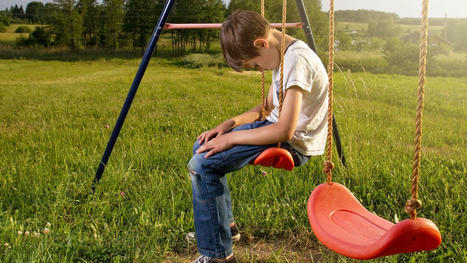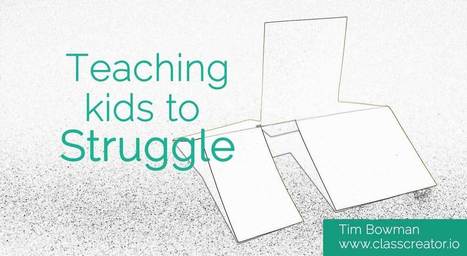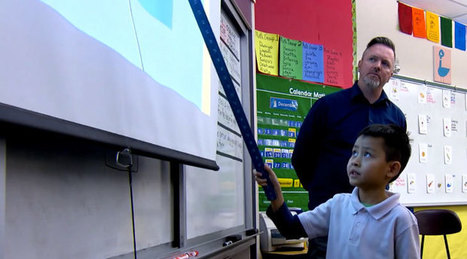 Your new post is loading...
 Your new post is loading...

|
Scooped by
John Evans
|
What to do—and not to do—when our kids experience disappointment.

|
Scooped by
John Evans
|
Bullying behaviour often emerges in childhood, and the consequences for victims can last a lifetime. But what makes a child become a bully?

|
Scooped by
John Evans
|
“What do you want to be when you grow up?”
When I was a kid, I dreaded the question. I never had a good answer. Adults always seemed terribly disappointed that I wasn’t dreaming of becoming something grand or heroic, like a filmmaker or an astronaut.
In college, I finally realized that I didn’t want to be one thing. I wanted to do many things. So I found a workaround: I became an organizational psychologist. My job is to fix other people’s jobs. I get to experience them vicariously — I’ve gotten to explore how filmmakers blaze new trails and how astronauts build trust. And I’ve become convinced that asking youngsters what they want to be does them a disservice.

|
Scooped by
John Evans
|
"For several months, Cara has been working up the courage to approach her mom about what she saw on Instagram. Not long ago, the 11-year-old—who, like all the other kids in this story, is referred to by a pseudonym—discovered that her mom had been posting photos of her, without prior approval, for much of her life. “I’ve wanted to bring it up. It’s weird seeing myself up there, and sometimes there’s pics I don’t like of myself,” she said."

|
Scooped by
John Evans
|
"It was a reminder for me to hug our kiddos a little tighter. To give a few more high fives. To dance a little more. To laugh as much as possible. To celebrate every single moment. For we may be the only way celebrating that challenge and I want to be the pebble in that child’s pond of life where ripples are felt for years to come. Remember this next week, as we get closer and closer to the Holidays, that the holidays aren’t happy experiences for all of our students. Some dread those days where they have to be at home instead of being at school. And because of that fear and dread they will act out in different ways."

|
Scooped by
John Evans
|
Nothing elicits an eye roll faster from students (and younger teachers!) than a conversation that starts with “back when I was in school…” because it’s a fact that our students live in a very different world than the one in which we grew up, thanks to technology. But it’s also understandable that it can be frustrating, especially for teachers who’ve been around a long time, when students don’t respond to our tried and true methods.
There’s one thing educators need to agree on, and it’s the reality that we must root our instruction in the fast-paced world in which our students live, with an eye to the skills they will need to succeed in the future. And clinging to old norms and teaching methods just isn’t going to cut it.
Here are three facts about our students that we need to take into consideration as we think about the best way to shape our instruction.

|
Scooped by
John Evans
|
While many educators now recognize that “noncognitive” factors that affect how a student thinks about his or her abilities are important to learning academic content, there’s little consensus about how teachers can help build those qualities. Some districts are trying to include noncognitive factors in measures of school effectiveness, while other schools focus on certain character qualities as part of their mission.
Educators are trying to figure out how to motivate students to work hard in school and to help them see the rewards for that hard work as a real possibility. But that work is particularly challenging as the public school population becomes increasingly low income and children often come to school having experienced chronic stress or trauma in their home lives that significantly impact their ability to regulate emotions, focus, and deescalate situations.

|
Scooped by
John Evans
|
How do you teach a Growth Mindset? By letting students struggle and share. This activity has been used by thousands of educators to teach Growth Mindset.

|
Scooped by
John Evans
|
In A Story of a Young Life Turned Around by Great Teachers, Kevin Honeycutt shared, “I believe you can flip a kid on any given day in one hour.” I’ve been thinking. Can you?
Well, when something horrific happens: death in the family or other trauma — maybe not. But on most days with most kids, I think this is true. I had an upset child just yesterday. We had a private talk as she was coming into the classroom (straggling behind everyone else). And yes, she was flipped. My words and our interaction FLIPPED HER and changed her day. When I saw that happen, I realized that it is true. We can flip kids (and perhaps each other) if we pay attention and notice.
Here are some ways you can flip a kid. Please share yours in the comments. Let’s get this kid flipping conversation going!

|
Scooped by
John Evans
|
British author and speaker Sir Ken Robinson is known for several accomplishments, from his books to his professorships to his TED talks. But in 2006, he gained recognition for something that no other TED speaker in history has done. It was back then that he delivered a TED talk on the topic of whether schools kill students’ creativity—and today, that video has been viewed over 43 million times, currently holding the title of “most popular TED talk of all time.”
Well, it’s been ten years, and with the recent proliferation of terms like “personalized,” “mastery-based,” and “blended” in the education world, some of Robinson’s viewers may wonder if or how his take on schools has changed.

|
Scooped by
John Evans
|
Math teachers of older students sometimes struggle to get students to explain their thinking with evidence. It’s hard to get kids in the habit of talking about how they are thinking about a problem when they’ve had many years of instruction that focused on getting the “right answer.” That’s why educators are now trying to get students in the habit of explaining their thinking at a young age. The Teaching Channel captured kindergarten and first grade teachers pushing students to give evidence for their answers in situations where there are several ways to think about a problem.
|

|
Scooped by
John Evans
|
Looking for a fabulous resource for igniting discussion about having a growth mindset with your kids? Look no further! These 10 TEDTalks are guaranteed to inspire children at school or home to reach their goals despite any difficulties or obstacles they may encounter.

|
Scooped by
John Evans
|
You may have heard of play. It’s that thing children do – the diverse range of unstructured, spontaneous activities and behaviours.
Children play in many ways, including by exploring movements, constructing with equipment, creating games, using imagination and chasing others around a playground.
The UN Convention on the Rights of the Child recognises play as every child’s basic right. But play is becoming extinct. Global studies, across generations, have confirmed outdoor children’s play has been declining, across all age groups, for decades.
Play is every child’s basic right. from shutterstock.com
Unstructured play improves learning and social and physical development. Providing a variety of play options, improved play access and fewer restrictions can encourage children to engage in physical activity with peers in line with their imaginations.

|
Scooped by
John Evans
|
The first time Jessica Calise can remember her 9-year-old son Joseph's anxiety spiking was about a year ago, when he had to perform at a school concert. He said his stomach hurt and he might throw up. "We spent the whole performance in the bathroom," she recalls.
After that, Joseph struggled whenever he had to do something alone, like showering or sleeping in his bedroom. He would beg his parents to sit outside the bathroom door or let him sleep in their bed. "It's heartbreaking to see your child so upset and feel like he's going to throw up because he's nervous about something that, in my mind, is no big deal," Jessica says.
Jessica decided to enroll in an experimental program, one that was very different from other therapy for childhood anxiety that she knew about. It wasn't Joseph who would be seeing a therapist every week — it would be her.
The program was part of a Yale University study that treated children's anxiety by teaching their parents new ways of responding to it.
"The parent's own responses are a core and integral part of childhood anxiety," says Eli Lebowitz, a psychologist at the Yale School of Medicine who developed the training.

|
Scooped by
John Evans
|
"For our kids comics list, we defined the category as any book aimed at, or unambiguously appropriate for, younger readers. Titles span from the high end of Young Adult to the very earliest stages of independent reading, and we ultimately leave it up to our readers to decide what’s most fitting for the budding comic fans in their lives."

|
Scooped by
John Evans
|
"Canadian kids aren’t just inactive but lack the fundamental movement skills, knowledge and motivation to engage in physical activities and play, according to a new study.
The study, led by researchers at the Children’s Hospital of Eastern Ontario, examined more than 10,000 children aged 8-12 across Canada over three years and found that only one-third of kids meet what is thought to be a basic level of physical literacy.
That means that most kids lack skills like throwing a ball and perform below expectations in aerobic tests, don’t get enough physical activity and what’s more — they don’t want to."

|
Scooped by
John Evans
|
"I truly believe that part of being an advocate for kids is believing that all of them, no matter what, possess redeeming qualities. I know that I see kids do absolutely amazing things with talent and grit and an awareness of other people that I don’t remember myself or my classmates having when I was their age. On the flip side, I know we have students who are so angry and struggling and do things that are unkind and frankly, sometimes violent. But, instead of asking why the students are so poorly behaved, I think the better question is what support did we miss as parents/educators/society and how can we bring out the goodness? My point being…no matter the child, if we don’t believe that there is a place inside of them that has the potential for greatness then that is more about our shortcomings than it is about them."

|
Scooped by
John Evans
|
"In the past week, I’ve read several studies that are scary to me… it’s the scary truth about what’s hurting our kids. We all know that what our kids hear becomes their inner voice, but it’s hard to control what they hear from others, isn’t it?
CNN recently interviewed Dr. Jean Twenge, author of iGen and her interview worried me – because I saw the truth that I would be facing in just a few short years. Dr. Twenge started doing research 25 years ago on generational differences, but when 2011 -2012 hit, she saw something that would scare her to the core. This is the year when those having iPhones went over the 50% mark."

|
Scooped by
John Evans
|
By the time my daughter was 14 years old, she had invented two life-saving devices and had one patent and one pending. People often ask how I “raised an inventor.” The real question, however, is: “Why doesn’t everyone understand that inventing is just a form of problem-solving that results in a physical solution?”
When my daughter, Alexis, started inventing as a young kid, I dismissed her creations as anything important. My teachers had taught me that inventors were geniuses like Edison, Bell, and Tesla. They also taught me that you need all those years of book learning in high school and college before you can do anything important like inventing something.
Alexis shattered that myth when she looked at me one day and said, “Mom, inventing is just problem-solving that results in a physical solution. I don’t understand why people think it’s so amazing. Inventing is human; we all can do it.”

|
Scooped by
John Evans
|
Did you know that parents are the number-one influencer on their kids’ financial behaviour? If you’re reading this and are a bit worried because you’re not the greatest with your money—or you’re not exactly sure how to approach the subject of teaching kids about money—don’t panic! There are many ways to make your kid money smart, even if you’re not. That’s exactly what journalist and commentator Beth Kobliner’s latest book, Make Your Kid a Money Genius (Even If You’re Not), is all about.

|
Scooped by
John Evans
|
So I asked our writers to share some of their favorite conversation starters with their kids. These are especially great after a long school day when your babies don’t want to chat.
|
 Your new post is loading...
Your new post is loading...
 Your new post is loading...
Your new post is loading...


































